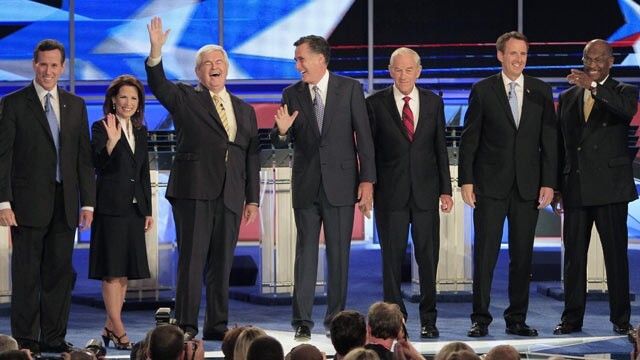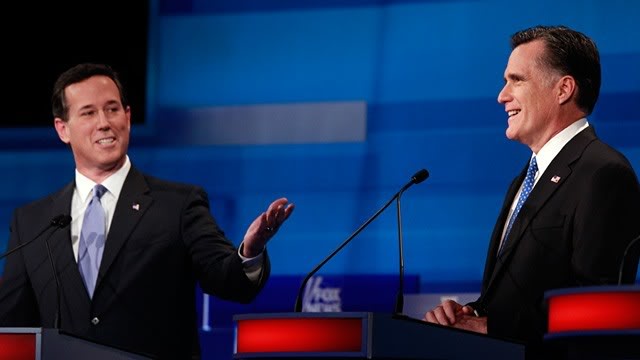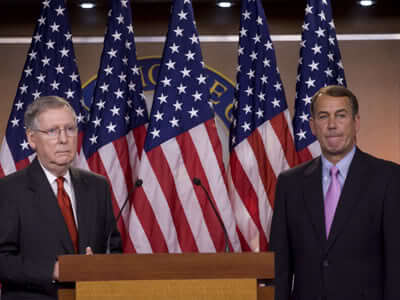RS: 73 Rules For Running For President As A Republican
We do not yet know who the Republican presidential nominee will be in 2016. We do not even know for certain who the candidates will be, although several are visibly positioning themselves to run. We all have our own ideas about who should run and what the substance of their platforms should be. But even leaving those aside, it’s possible to draw some lessons from the past few GOP campaign cycles and offer some advice that any prospective candidate should heed, the sooner the better. Some of these rules are in a little tension with each other; nobody said running for President was easy. But most are simply experience and common sense.
1-Run because you think your ideas are right and you believe you would be the best president. Don’t stay out because your chances are slim, and don’t get in because someone else wants you to. Candidates who don’t have a good reason for running or don’t want to be there are a fraud on their supporters.
2-Ask yourself what you’re willing to sacrifice or compromise on to win. If there’s nothing important you’d sacrifice, don’t run; you will lose. If there’s nothing important you wouldn’t, don’t run; you deserve to lose.
3- If you don’t like Republican voters, don’t run.
4-Don’t start a campaign if you’re not prepared for the possibility that you might become the frontrunner. Stranger things have happened.
5-If you’ve never won an election before, go win one first. This won’t be the first one you win.
6-Winning is what counts. Your primary and general election opponents will go negative, play wedge issues that work for them, and raise money wherever it can be found. If you aren’t willing to do all three enthusiastically, you’re going to be a high minded loser. Nobody who listens to the campaign-trail scolds wins. In the general election, if you don’t convey to voters that you believe in your heart that your opponent is a dangerously misguided choice, you will lose.
7-Pick your battles, or they will be picked for you. You can choose a few unpopular stances on principle, but even the most principled candidates need to spend most of their time holding defensible ground. If you have positions you can’t explain or defend without shooting yourself in the foot, drop them.
8-Don’t be surprised when people who liked you before you run don’t like you anymore. Prepare for it.
9-Be sure before you run that your family is on board with you running. They need to be completely committed, because it will be harder than they can imagine. Related: think of the worst possible thing anyone could say about the woman in your life you care about the most, and understand that it will be said.
10-You will be called a racist, regardless of your actual life history, behavior, beliefs or platform. Any effort to deny that you’re a racist will be taken as proof that you are one. Accept it as the price of admission.
11-Have opposition research done on yourself. Have others you trust review the file. Be prepared to answer for anything that comes up in that research. If there’s anything that you think will sink you, don’t run.
12-Ask yourself if there’s anything people will demand to know about you, and get it out there early. If your tax returns or your business partnerships are too important to disclose, don’t run. (We might call this the Bain Capital Rule).
13-Realize that your record, and all the favors you’ve done, will mean nothing if your primary opponent appears better funded.
14-Run as who you are, not who you think the voters want. There’s no substitute for authenticity.
15-Each morning, before you read the polls or the newspapers, ask yourself what you want to talk about today. Talk about that.
16-If you never give the media new things to talk about, they’ll talk about things you don’t like.
17-Never assume the voters are stupid or foolish, but also don’t assume they are well-informed. Talk to them the way you’d explain something to your boss for the first time.
18-Handwrite the parts of your platform you want voters to remember on a 3×5 index card. If it doesn’t fit, your message is too complicated. If you can’t think of what to start with, don’t run.
19-Voters may be motivated by hope, fear, resentment, greed, altriusm or any number of other emotions, but they want to believe they are voting for something, not against someone. Give them some positive cause to rally around beyond defeating the other guy.
20-Optimism wins. If you are going to be a warrior, be a happy warrior. Anger turns people off, so laugh at yourself and the other side whenever possible, even in a heated argument.
21-Ideas don’t run for President; people do. If people don’t like you, they won’t listen to you.
22-Your biography is the opening act. Your policy proposals and principles are the headliner. Never confuse the two. The voters know the difference.
23-Show, don’t tell. Proclaiming your conservatism is meaningless, and it’s harder to sell to the unconverted than policy proposals and accomplishments that are based on conservative thinking.
24-Being a consistent conservative will help you more than pandering to nuts on the Right. If you can’t tell the difference between the two, don’t run.
25-Winning campaigns attract crazy and stupid people as supporters; you can’t get a majority without them. This does not mean you should have crazy or stupid people as your advisers or spokespeople.
26-Principles inspire; overly complex, specific plans are a pinata that can get picked to death. If you’re tied down defending Point 7 of a 52 point plan that will never survive contact with the Congress anyway you lose. Complex plans need to be able to be boiled down to the principles and incentives they will operate on. The boiling is the key part.
27-Be ready and able to explain how your plans benefit individual voters. Self-interest is a powerful thing in a democracy.
28-If you haven’t worked out the necessary details of a policy, don’t be rushed into releasing it just because Ezra Klein thinks you don’t have a plan. Nobody will care that you didn’t have a new tax plan ready 14 months before Election Day.
29-Don’t say things that are false just because the CBO thinks they’re true.
30-If you don’t have a position on an issue, say that you’re still studying the issue. Nobody needs an opinion on everything at the drop of a hat, and you’ll get in less trouble.
31-When in doubt, go on the attack against the Democratic frontrunner rather than your primary opponents. Never forget that you are auditioning to run the general election against the Democrat, not just trying to be the least-bad Republican.
32-Attacking your opponents from the left, or using left-wing language, is a mistake no matter how tempting the opportunity. It makes Republican voters associate you with people they don’t like. This is how both Newt Gingrich and Rick Perry ended up fumbling the Bain Capital attack.
33-Be prepared to defend every attack you make, no matter where your campaign made it. Nobody likes a rabbit puncher. Tim Pawlenty’s attack on Romneycare dissolved the instant he refused to repeat it to Romney’s face, and so did his campaign.
34-If your position has changed, explain why the old one was wrong. People want to know how you learn. If you don’t think the old one was wrong, just inconvenient, the voters will figure that out.
35-If a debate or interview question is biased or ridiculous, point that out. Voters want to know you can smell a trap. This worked for Newt Gingrich every single time he did it. It worked when George H.W. Bush did it to Dan Rather. It will work for you.
36-Cultivate sympathetic media, from explicitly conservative outlets to fair-minded local media. But even in the primaries, you need to engage periodically with hostile mainstream media outlets to stay in practice and prove to primary voters that you can hold your ground outside the bubble.
37-Refuse to answer horserace questions, and never refer to “the base.” Leave polls to the pollsters and punditry to the pundits. Mitt Romney’s 47% remark was a textbook example of why candidates should not play pundit.
38-Hecklers are an opportunity, not a nuisance. If you can’t win an exchange with a heckler, how are you going to win one with a presidential candidate? If you’re not sure how it’s done, go watch some of Chris Christie’s YouTube collection.
39-Everywhere you go, assume a Democrat is recording what you say. This is probably the case.
40-Never whine about negative campaigning. If it’s false, fight back; if not, just keep telling your own story. Candidates who are complaining about negative campaigning smell like losing.
41-“You did too” and “you started it” get old in a hurry. Use them sparingly.
42-If you find yourself explaining how the Senate works, stop talking. If you find yourself doing this regularly, stop running.
43-Never say “the only poll that matters is on Election Day” because only losers say that, and anyway even Election Day starts a month early now. But never forget that polls can and do change.
44-Voters do not like obviously insincere pandering, but you cannot win an election by refusing on principle to meet the voters where they are. That includes, yes, addressing Hispanic and other identity groups with a plan for sustained outreach and an explanation of how they benefit from your agenda. Build your outreach team, including liaisons and advertising in Spanish-language media, early and stay engaged as if this was the only way to reach the voters. For some voters, it is.
45-Post something as close to daily as possible on YouTube featuring yourself – daily message, clips of your best moments campaigning, vignettes from the trail. You can’t visit every voter, but you can visit every voter’s computer or phone.
46-Never suggest that anybody would not make a good vice president. Whatever they may say, everyone wants to believe they could be offered the job.
47-If you’re not making enemies among liberals, you’re doing it wrong.
48- If you don’t have a plausible strategy for winning conservative support, you’re in the wrong party’s primary.
49-The goal is to win the election, not just the primary. Never box yourself in to win a primary in a way that will cause you to lose the election.
50-Don’t bother making friends in the primary who won’t support you in the general. Good press for being the reasonable Republican will evaporate when the choice is between you and a Democrat.
51-Some Republicans can be persuaded to vote for you in the general, but not in the primary. Some will threaten to sit out the general. Ignore them. You can’t make everyone happy. Run a strong general election campaign and enough of them will come your way.
52-Don’t actively work to alienate your base during the primary. Everyone expects you to do it in the general, and you gain nothing for it in the primary.
53-Don’t save cash; it’s easier to raise money after a win than to win with cash you saved while losing. But make sure your organization can run on fumes now and then during dry spells.
54-If you’re not prepared for a debate, don’t go. Nobody ever had their campaign sunk by skipping a primary debate. But looking unprepared for a debate can, as Rick Perry learned, create a bad impression that even a decade-long record can’t overcome.
55-The Iowa Straw Poll is a trap with no upside. Avoid it. Michele Bachmann won the Straw Poll and still finished last in Iowa.
56-Ballot access rules are important. Devote resources early to learning, complying with them in every state. Mitt Romney didn’t have to face Newt Gingrich or Rick Santorum in Virginia – even though both of them live in Virginia – because they didn’t do their homework gathering signatures.
57-If you can’t fire, don’t hire. In fact, don’t run.
58-Hire people who are loyal to your message and agenda, and you won’t have to worry about their loyalty to your campaign.
59-Don’t put off doing thorough opposition research on your opponents. By the time you know who they are, the voters may have decided they’re somebody else.
60-You can afford to effectively skip one early primary. You can’t skip more than that. You are running for a nomination that will require you to compete nationally. (Call this the Rudy Giuliani Rule).
61-Use polling properly. Good polling will not tell you what to believe, but will tell you how to sell what you already believe.
62-Data and GOTV are not a secret sauce for victory. But ignoring them is a great way to get blindsided.
63-Don’t plan to match the Democrats’ operations and technology, because then you’re just trying to win the last election. Plan to beat it.
64-Political consultants are like leeches. Small numbers, carefully applied, can be good for you. Large numbers will suck you dry, kill you, and move on to another host without a backward look.
65-Never hire consultants who want to use you to remake the party. They’re not Republicans and you’re not a laboratory rat.
66-This is the 21st century. If you wouldn’t want it in a TV ad, don’t put it in a robocall or a mailer. Nothing’s under the radar anymore.
67-Always thank your friends when they back you up. Gratitude is currency.
68-Every leak from your campaign should help your campaign. Treat staffers who leak unfavorable things to the press the way you would treat staffers who embezzle your money. Money’s easier to replace.
69-Getting distance from your base in the general on ancillary issues won’t hurt you; they’ll suck it up and independents will like it. Attacking your base on core issues will alienate your most loyal voters and confuse independents.
70-If you are convinced that a particular running mate will save you from losing, resign yourself to losing because you’ve already lost.
71-Don’t pick a VP who has never served in Congress or run for president in his or her own right. Even the best Governors have a learning curve with national politics, and even the best foreign policy minds have a learning curve with electoral politics. And never steal from the future to pay for the present. Your running mate should not be a Republican star in the making who isn’t ready for prime time. In retrospect, Sarah Palin’s career was irreparably damaged by being elevated too quickly to the national level.
72-Never, ever, ever take anything for granted. Every election, people lose primary or general elections because they were complacent.
73-Make a few rules of your own. Losing campaigns imitate; winning campaigns innovate.




